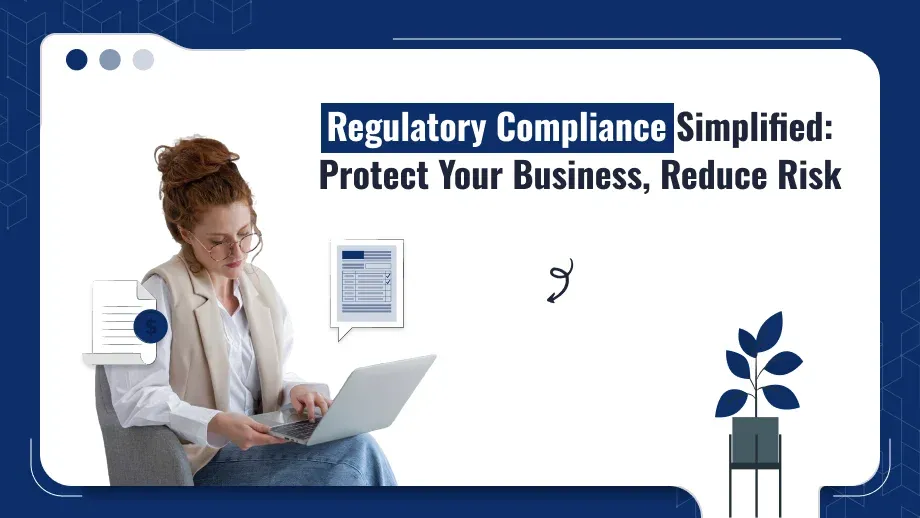Compliance with regulations involves following the laws, standards and guidelines that govern businesses. It is a way to ensure that business procedures comply with legal standards, that vary based on the industry and location.
Grab a chance to avail 6 Months of Performance Module for FREE
Book a free demo session & learn more about it!
-
Will customized solution for your needs
-
Empowering users with user-friendly features
-
Driving success across diverse industries, everywhere.
Grab a chance to avail 6 Months of Performance Module for FREE
Book a free demo session & learn more about it!
Superworks
Modern HR Workplace
Your Partner in the entire Employee Life Cycle
From recruitment to retirement manage every stage of employee lifecycle with ease.


Seamless onboarding & offboarding
Automated compliance & payroll
Track performance & engagement
Regulatory Compliance Simplified: Protect Your Business, Reduce Risk
- regulatory compliance monitoring
- 9 min read
- November 11, 2024
What is Regulatory Compliance?
The term “regulatory compliance” refers to following the rules, laws, and regulations that regulate the business activities. All businesses, from small startups to big corporations, must be in compliance with these regulations in order to be legally operating and be protected from fines. These regulations vary according to sector and nation, covering everything from data security and protection to safety for the environment.
However, compliance doesn’t only mean staying clear of penalties. There are many advantages of ensuring compliance with regulations in observing these laws for example, increasing customer confidence and enhancing their credibility. When there are regulations in place businesses can run their operations efficiently and with integrity, making sure there are no risks and they’re prepared for audits or inspections.
In this article will help you understand why regulatory compliance is important,’ the most important areas that you should focus on, as well as the best way to develop the right compliance program which protects your company. We’ll go over all you need to learn about compliance, and how it affects the operations of your business.
Why is Regulatory Compliance Important for Your Business?
Regulative compliance is more than an obligation; it’s an essential element to protect firms in many ways. This is why it’s essential for any business looking to expand sustainably and maintain compliance with the law.
1. Avoiding Financial Penalties and Legal Risks
Failure to comply with compliance and administrative rules can trigger gigantic fines, legitimate battles or indeed the being suspended from business activities. As an case, firms who come up short to follow to the Merchandise and Services Charge (GST) rules in India are likely to confront strong sanctions.
In the same way, not complying with the controls on information protection could cause legal proceedings and reputational damage, in specific since privacy-related concerns are expanding around the world.
2. Building and Maintaining Customer Trust
The trust of customers is significant to long-term growth, especially in the technological age where consumers are getting to be more informed approximately their rights. If a business follows to directions and lawful compliance necessities that appears assurance to protect client information, ensuring their security, as well as ensuring security of the item.
3. Ensuring Business Continuity and Minimizing Risks
If they follow to compliance and regulatory requirements, organizations reduce the risks that can arise from operational interruptions, like security breaches, fraud as well as compliance-related shutdowns.
The compliance with regulatory requirements ensures that firms are operating with the appropriate guidelines, policies, and security measures in place to work without interruption. It reduces the risk of being exposed to dangers and allows businesses to concentrate on customer service and growth.
4. Enhancing Corporate Reputation and Attracting Investments
Firms that have strong compliance with regulatory structures are attractive to investors. The reputation of a company’s legal regulatory compliance can positively impact the business’s performance, and shows that the business is committed to ethics and a sense of accountability. Investors generally feel more confident about companies that meet the rules of compliance, since they’re less likely be subject to fines or shut downs.
5. Supporting Ethical Business Practices
Compliance with regulations promotes ethical business conduct by making sure that firms adhere to ethical legal and environmental standards, as well as labor laws as well as product regulations. Businesses that comply with these guidelines not only meet legal requirements but also build an ethical culture that resonates with partners, employees, and the public. By integrating payroll software into their compliance strategy, companies can streamline these efforts, reducing errors and ensuring consistent adherence to regulatory standards.
Tired of Payroll Hassles? Ensure compliance with ease.
Book a Payroll Demo with Superworks today!
Challenges in Regulatory Compliance
Although it is essential, regulatory Compliance with regulations brings a myriad of problems that companies must be aware of:
-
Constantly Evolving Regulations
The laws change regularly, which requires firms to keep up-to date and change. In the case of data protection, regular changes to data protection laws or tax legislation mean companies need to be aware of penalty charges.
-
Complexity Across Jurisdictions
When a business operates across multiple areas or countries, ensuring the compliance process becomes more complicated. Each state or nation has specific regulations, which add layers of control that demand funds to effectively manage.
-
Resource Allocation
The management of compliance requires the time and resources. Smaller businesses may have difficulty to find the resources needed to satisfy all requirements of the regulatory system which could lead to non-compliance.
-
Balancing Compliance and Business Goals
Focusing on regulatory compliance only will limit the growth of your business, however, ignoring it can open doors to legal risk. Many companies struggle to strike the perfect balance between conforming to the law and working towards corporate goals.
-
Internal Awareness and Training
Making sure that employees are aware of what is required of them is crucial however, it is a bit difficult. Insufficient training could result in mistakes or a breach which can be costly, particularly in sectors which have high standards, like financial or healthcare.
These issues highlight the necessity of having a proactive strategy for compliance to ensure compliance without jeopardizing your business’s efficiency.
Also See: How to Choose the Right Payroll Software for Small Business
Building a Strong Compliance Strategy
A well-planned compliance plan can help firms stay on top of regulations and reduces the risk. How to create a successful strategy:
1. Conduct a Compliance Audit
Begin with an internal audit of the company to assess the current procedures and pinpoint areas in which the business may not be in compliance. The regular audits provide a foundation for regulatory compliance, and allow companies to make the needed improvements.
2. Develop Clear Policies and Procedures
The creation of policies that are inclusive of the relevant laws is essential. A clear set of guidelines provides employees with an outline of compliance, as well as reduce the possibility of being a victim. Be sure that the you have your policies readily available and regularly updated to keep up with changes in legislation.
3.Implement Regular Training Programs
Training on compliance ensures that employees are aware of how regulations affect their jobs. This is especially important for high-risk fields like financial security, data security and safety of employees. Sessions of training should be conducted regularly to stay current with the latest the latest regulatory changes.
4. Use Compliance Management Tools
The use of compliance software is a way to simplify the tasks including monitoring, reports, and managing policies. Automation software reduces human errors and help companies remain within the regulatory and compliance guidelines.
5. Establish Continuous Monitoring and Reporting
An effective compliance plan includes continuous monitoring and reporting of compliance actions. Monitoring regularly ensures that any problems are dealt with promptly to help businesses adjust quickly to modifications to the regulations.
6. Assign a Compliance Officer
The appointment of a compliance manager or a team can help ensure that the organization is in line with its compliance targets. The job entails monitoring compliance to policies and regulations, ensuring that they are updated and procedures, as well as overseeing the compliance audits and reporting.
Through these measures, organizations are able to create a compliance plan that will not just protect their business from fines but is in line with their corporate goals.
Consequences of Non-Compliance
Inability to adhere to regulatory standards may result in severe consequences which can impact both the operations of a business in the short term and the long-term viability of business. Let’s take a look at the main risks involved with infractions:
-
Financial Penalties and Legal Actions
In the event of non-compliance, it can result in huge penalty or fines. Businesses that do not meet taxes for example of regulatory compliance, could be penalized under tax laws such as the Income Tax Act in India. Legal and regulatory compliance can be expensive and exhausting, draining the resources of a company.
-
Reputational Damage
An individual compliance error will seriously harm a company’s image. Investors and customers could have a negative impression of the business should they discover lapses regarding compliance or regulatory requirements. Rebuilding trust following a compliance violation can be difficult and be a long time.
-
Operational Disruptions
Infractions to regulations can result in operating restrictions, including the loss of licenses, or inaccessibility to certain market. In the case of a company that is not in compliance with regulations could be subject to temporarily shut downs from FSSAI.
Food Safety and Standards Authority of India (FSSAI) until the issues are solved. These disruptions could result in loss of revenue and impact employee morale.
-
Higher Risk of Data Breaches
Inadequate regulatory compliance with regulations for data protection could result in security risks. If the company’s security procedures aren’t up to scratch and they expose sensitive personal information of customers. Data breaches don’t just lead to financial fines, but they also undermine the customer’s trust and loyalty.
-
Missed Opportunities for Growth
Infractions can discourage investors and those who appreciate honesty and ethics. Investors are often wary of businesses with compliance issues, which can limit their potential growth as well as access to financing opportunities.
This is a clear indication of the necessity of having a solid compliance plan to protect the company’s financial health and its reputation.
Conclusion
It’s not just concerned with avoiding fines or ensuring compliance with legally required requirements. It’s vital to build an efficient and reliable company. By being proactive in ensuring compliance, businesses don’t just avoid fines—they also gain a competitive edge with greater customer confidence and operational stability.
You can also use hrms & payroll software.Superworks can support these efforts with payroll software that simplifies compliance management, keeping your business on track and trusted by customers.
A well-designed regulatory compliance program helps align the business’s operations to the ethical and legal requirements reduces risk and improves the reputation of brands. Regularly audits, regular training of employees as well as the utilization of tools for managing regulatory compliance aid in ensuring that businesses remain prepared for any periodic regulatory changes as well as inspections.
In an environment where rules are constantly changing, keeping up to comply with compliance and regulatory requirements is vital. By establishing a strong foundation of compliance, companies can concentrate on expanding their business with confidence that they’re legally safe and ethically solid.
FAQs
1. What exactly is compliance with regulations in the business world?
2. What is the significance of regulatory compliance?
Compliance safeguards businesses from financial penalties, legal concerns as well as reputational harm. Also, it helps build confidence with investors and customers as well as ensures the operation is ethical and helps to ensure long-term expansion by decreasing the risk.
3. What are some examples of the regulatory conformity requirements?
The most common examples are legislation on protection of data (such such as the Indian IT Rules and the Digital Personal Data Protection Bill) and financial reporting regulations (Companies Act of 2013,) as well as industry-specific rules (such such as the FSSAI standard to ensure food security).
4. Technology can help in regulation compliance?
The software for compliance management automates management of reporting, tracking and management of policies. It aids businesses to stay up in compliance with the law, minimize the chance of human error and speed up processes for compliance.
5. What happens if a firm does not comply with rules?
Failure to comply can result in sanctions for financial loss, legal penalties operating restrictions and even reputational harm. This can lead to lost growth opportunities as investors might be reluctant to work with businesses that have not been compliant.
6. What frequency should compliance audits be carried out?
Audits for compliance must be performed annually, or even more often for risky sectors. Audits regularly help to identify any areas of weakness and assure continuous alignment to the changing regulatory standards.
7. Who is accountable to ensure compliance within a business?
Compliance is a shared responsibility A designated team or Compliance Officer generally oversees the organization's activities to ensure compliance. The leadership team also plays an important function in helping and enforcing measures to ensure compliance.



